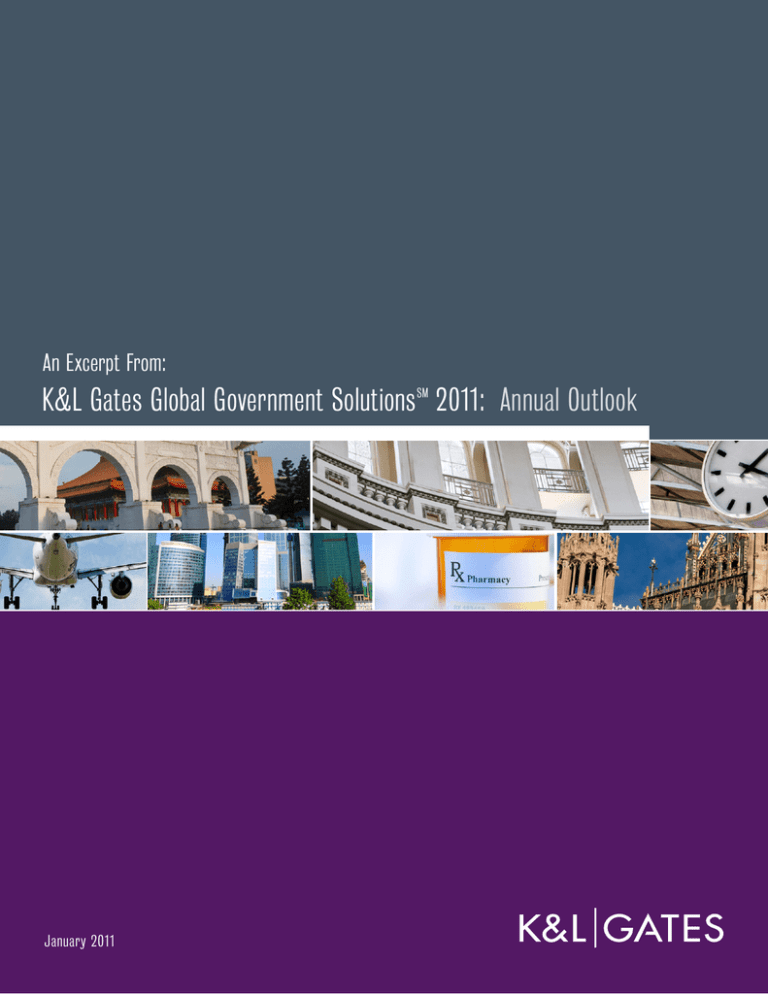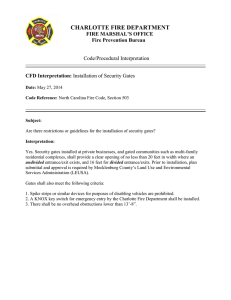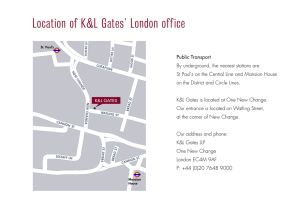
An Excerpt From:
K&L Gates Global Government Solutions SM 2011: Annual Outlook
January 2011
Europe
Public-Private Partnership in the Russian Federation
Public-private partnerships (“PPP”) have been declared a key element for economic
development in the Russian Federation’s Program for Social and Economic
Development, which runs through the year 2020. Relevant federal agencies have
provided guidance on key aspects of the program, special economic zones,
investment funds and concession agreements. In addition, certain administrative
regions in Russia are considering regional laws related to PPP.
Two initiatives are particularly noteworthy:
(a) a state investment fund for financing
infrastructure projects, and (b) the creation
of special economic zones in the
Russian Federation.
Investment Fund
The Investment Fund of the Russian
Federation (the “Fund”) was created
to promote cooperation between the
Russian state and private business and to
facilitate the participation of the private
sector in large-scale projects, both on a
national and regional level. The Fund is
not a separate legal entity, but rather is
a part of the Russian state budget that is
specially allocated for financing projects
of great significance for infrastructure
development. The Fund was created by
the Russian Federation in 2005, and
regulations governing its activities were
issued in 2008 and 2010.
The Fund, which was designed to finance
both national and regional projects,
has financed more than 30 projects to
date, including the construction of roads,
railroads, factories, plants, and various
projects in housing and community
services. In order to qualify for the
receipt of funds from the Fund, a national
project’s value must be a minimum of
five billion rubles (approximately $163
million), and the value of a regional
project must be at least five hundred
million rubles (or approximately $16.3
million). The participation of private
investors is required in any project in
which the Fund invests. Private investors
must finance at least 25 percent of
national projects and 50 percent of
regional projects. All projects must
receive the positive endorsement of the
investment advisor.
Special Economic Zones
Another PPP-related measure is the
creation of special economic zones,
which provide business activities
conducted in those zones with certain
benefits, including exemption from
customs duties, VAT, and excise duties.
Currently, there are four types of special
economic zones:
• Special economic zones for
industrial production;
important hub in the region, taking
advantage of the Northern Sea
Route as an international transit
corridor.
• A new tourism and recreation special
economic zone named “Hvalynskiye
Kholmy” is planned in the Saratov
region, which is expected to result in
a significant influx of tourists.
• An industrial special economic zone
known as “Titanic Valley” is expected
to be created in the Sverdlovsk
region. Financing in the amount of
10 billion rubles (approximately
$326 million) will be provided
exclusively by regional authorities
and private investors.
William M. Reichert (Moscow)
william.reichert@klgates.com
Marina E. Lebedeva (Moscow)
marina.lebedeva@klgates.com
• Special economic zones for
technology development;
• Special economic zones for tourism
and recreation; and
• Special economic zones for ports.
These zones are designated by the
Russian government through a tender
process and are generally created for
a term of 20 years, although economic
zones for ports are created for 49 years.
Users of the special economic zones
enter into agreements for their activities
and are guaranteed to be exempt from
unfavorable changes in the law within the
terms of such agreements.
Further development of special
economic zones is planned for 2011.
Plans include:
• A special economic port zone in the
Petropavlovsk-Kamchatskiy region,
which is expected to become an
K&L Gates Global Government Solutions SM 2011 Annual Outlook
31
Anchorage
Los Angeles
San Diego
Austin
Miami
Beijing
Berlin
Moscow
San Francisco
Boston
Newark
Seattle
Charlotte
New York
Shanghai
Chicago
Dallas
Orange County
Singapore
Dubai
Palo Alto
Fort Worth
Paris
Spokane/Coeur d’Alene
Frankfurt
Pittsburgh
Taipei
Tokyo
Harrisburg
Portland
Raleigh
Hong Kong
London
Research Triangle Park
Warsaw Washington, D.C.
K&L Gates includes lawyers practicing out of 36 offices located in North America, Europe, Asia and the Middle
East, and represents numerous GLOBAL 500, FORTUNE 100, and FTSE 100 corporations, in addition to growth
and middle market companies, entrepreneurs, capital market participants and public sector entities. For more
information, visit www.klgates.com.
K&L Gates comprises multiple affiliated entities: a limited liability partnership with the full name K&L Gates LLP qualified in Delaware and maintaining offices
throughout the United States, in Berlin and Frankfurt, Germany, in Beijing (K&L Gates LLP Beijing Representative Office), in Dubai, U.A.E., in Shanghai (K&L Gates
LLP Shanghai Representative Office), in Tokyo, and in Singapore; a limited liability partnership (also named K&L Gates LLP) incorporated in England and
maintaining offices in London and Paris; a Taiwan general partnership (K&L Gates) maintaining an office in Taipei; a Hong Kong general partnership (K&L Gates,
Solicitors) maintaining an office in Hong Kong; a Polish limited partnership (K&L Gates Jamka sp.k.) maintaining an office in Warsaw; and a Delaware limited
liability company (K&L Gates Holdings, LLC) maintaining an office in Moscow. K&L Gates maintains appropriate registrations in the jurisdictions in which its offices
are located. A list of the partners or members in each entity is available for inspection at any K&L Gates office.
This publication is for informational purposes and does not contain or convey legal advice. The information herein should not be used or relied upon in regard to
any particular facts or circumstances without first consulting a lawyer.
©2011 K&L Gates LLP. All Rights Reserved.





